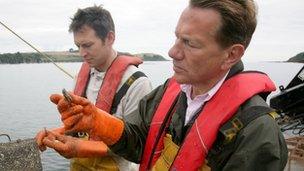Duchy of Cornwall ordered to reveal oyster farm data
- Published

The Prince of Wales derives his income from the Duchy of Cornwall
The Duchy of Cornwall, which comprises the Prince of Wales's business interests, has been ordered to disclose environmental data from an oyster farm.
The decision by an information tribunal redefines the duchy, a 700-year-old private institution, as a public body, leaving it open to further challenges.
The ruling came after a legal battle against the farm near Falmouth.
The tribunal said the duchy had not carried out an environmental assessment of the farm.
The potentially far-reaching decision defining the duchy as a public body under environmental regulations was made by the First-Tier Tribunal on information rights, a court that deals with disputes relating to freedom of information.
Michael Bruton, co-founder of the Port Navas Quay Conservation Committee, external, had asked the duchy to disclose information about the Port Navas Oyster Farm under legislation which requires public bodies to reveal their environmental record.

Oyster farms: Michael Portillo visited duchy farms as part of BBC TV show
He had challenged the cultivation of non-native oysters in the historic beds and had demanded to know what environmental assessments were made by the body that provides the Princes of Wales' income.
The area used for the oyster farm is an officially designated conservation zone which includes a protection plan for native oysters.
Mr Bruton argued that the area's conservation status required the duchy to properly assess the potential effect of introducing Pacific oysters.
In its ruling, the tribunal said, external: "As we understood the duchy's evidence, no Environmental Assessment of the oyster farm had been carried out."
It said the duchy had been wrong to withhold information about the farm because it should be regarded as a public body with a duty to disclose environmental information.
The duchy effectively dates from the 14th Century when Edward III created a perpetual body to generate income for each heir to the throne. Its precise workings and legal arrangements are steeped in history and tradition.
During the challenge, it argued that it could not be considered a public body for the purposes of environmental legislation because it was set up to provide a "private inheritance" and was an "entirely private operation".
But the tribunal ruled: "In a modern day context, the duchy is carrying out the public function or service of providing an income for the undertaking of an extremely important constitutional role for the UK."
A Duchy of Cornwall spokesperson said: "The duchy is reviewing the Tribunal's reasons for reaching its conclusion with a view to establishing whether to appeal the decision."
Graham Smith of campaign group Republic, which wants the Royal Family to be subjected to the Freedom of Information Act, said: "It sets a precedent and hopefully will subject Prince Charles's business dealings to greater scrutiny.
"It does remind us that Prince Charles does try to have it both ways, being a public figure and, when it suits him, a private enterprise.
"This reminds us that what the Duchy of Cornwall does is of public interest and it is wholly appropriate that they are subject to these regulations."
Follow Dominic Casciani on Twitter, external.
- Published31 October 2011